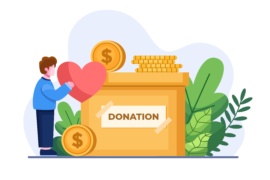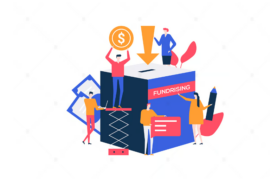Leading a nonprofit is a noble mission, driven by a desire to positively impact communities. However, for small Canadian nonprofits, navigating limited funds, tight budgets and competition can feel overwhelming. This is where Donor Management CRM comes in.
Challenges Faced by Small Canadian Nonprofits:
Small nonprofits often struggle with interconnecting hardships. Restricted staffing, financial constraints and lack of sophisticated tools can hinder connecting with donors, cultivating relationships and maximizing fundraising success. Additionally, Canada’s unique nonprofit landscape, like diverse local needs and regulations, adds complexity for these groups.
Importance of Thoughtful Donor Relations:
Achieving fundraising isn’t just about one-time gifts; it requires nurturing lasting donor bonds. For small nonprofits, fostering these relationships is paramount. Intentional donor management extends beyond transactions, prioritizing involvement, communication and understanding what motivates each giver. This personalized focus can transform one-time contributors into committed long-term supporters.
Introducing the Concept of Donor Management CRM:
In response to challenges small nonprofits face, Donor Management Customer Relationship Management systems have emerged as a transformative solution. Donor Management CRM acts as a comprehensive tool intended to streamline and optimize every aspect of donor interactions. It goes beyond basic contact details, providing features like tracking donor communications, examining fundraising campaign performance, and facilitating personalized donor engagement.
A Donor Management CRM serves as a centralized hub for managing donor information, allowing small nonprofits to organize, analyze and utilize data efficiently. This technology empowers organizations to move past manual, time-intensive processes, offering a scalable solution tailored to smaller groups’ unique needs and restrictions.
Understanding the Needs of Small Nonprofits
The complex challenges encountered by smaller charitable groups require a thoughtful comprehension of their constraints and struggles.
Principal Challenges Faced by Tiny Nonprofits Regarding Donor Administration:
One major difficulty faced by smaller organizations revolves around the nuances of donor management. Restricted staff often means wearing multiple hats, dedicating time to cultivating and maintaining benefactor bonds can become a logistical battle. The absence of dedicated assets for comprehensive donor engagement and correspondence can hinder forming robust relationships.
Additionally, tiny nonprofits might lack the monetary means to invest in expensive donor management solutions, leading to reliance on manual and time-draining processes. This not just risks operations’ efficiency but also constraints the organization’s ability to scale and broaden its impact.
Importance of Cost-Effectiveness and Resource Optimization:
For small nonprofits, each financial decision plays a crucial role in sustaining their mission. Recognizing the importance of cost-effectiveness and resource optimization is pivotal. Donor management solutions must align with these organizations’ financial restrictions while providing robust attributes that enhance efficiency.
Cost-effective solutions ensure small nonprofits can allocate more assets directly to their programs and initiatives, amplifying the positive impact on their communities. The value derived from donor management systems should far outweigh the investment, emphasizing the need for solutions offering a high return without compromising functionality.
Tailoring Strategies to Suit the Scale and Goals of Small Organizations:
Small nonprofits operate on a different scale compared to larger counterparts, and their aims often revolve around community-focused initiatives. Recognizing this, strategies for donor management must be tailored to suit the unique characteristics of smaller organizations. This involves prioritizing personalization in donor interactions, understanding the local context, and emphasizing community engagement.
Flexibility is key; donor management strategies need to adapt to evolving needs and growth stages of small nonprofits. A one-size-fits-all approach does not resonate with the dynamic nature of these organizations. Instead, tailored solutions that accommodate growth, while remaining mindful of limited assets, are crucial for sustained success of small nonprofits.
Key Features for Small Nonprofits
Understanding the particular needs of small non-profits is essential when selecting a Donor Management CRM system. In this article, we will explore the core capabilities that address the challenges faced by more diminutive organizations.
Key Features:
Contact Information: A robust contact system is the foundation. It moves beyond basic data storage, allowing small non-profits to track supporter interactions, preferences, and history. This feature facilitates tailored correspondence, vital for building lasting relationships.
Fundraising Campaign Analysis: Small non-profits regularly operate with tight budgets, making fundraising success critical. Donor Management CRM systems with evaluation tools offer valuable insight. These analyses enable refining strategies, focusing on successes, and optimizing resources for maximum impact.
Correspondence Tracking: Effective communication lies at the heart of donor participation. The ability to monitor and examine outreach ensures small non-profits can customize messaging for heightened impact. This involves tracking emails, newsletters, and societal interactions to comprehend what resonates with supporters.
Integration with Financial Systems: Seamless integration with economic systems simplifies tracking donations, costs, and fiscal wellness. This feature aids budgeting, financial planning, and guarantees transparency in economic transactions, vital for maintaining supporter trust.
Customization Alternatives for Scalability:
Small non-profits may commence with modest operations but aspire to grow and make a more considerable impact. Consequently, Donor Management CRM systems should offer customization choices allowing organizations to scale usage as they expand. Whether adding new capabilities, accommodating a larger supporter database, or incorporating with other resources, customization ensures the CRM system evolves with the organization’s needs.
Customization extends to tailoring the interface and workflows to match the unique processes of the non-profit. This ensures the system seamlessly integrates into prevailing operations, minimizing disruption and maximizing productivity.
Budget-Friendly Solutions Without Compromising Functionality:
Affordability is a critical consideration for small non-profits. Thankfully, there are Donor Management CRM solutions intended to be budget-friendly without compromising functionality. Open-source options, cloud-based systems, and platforms offering discounted rates for non-profits are viable choices.
Choosing an affordable solution does not mean forfeiting capabilities. It means finding a system that aligns with the organization’s financial constraints while providing the necessary instruments for effective donor management. Striking this balance ensures small non-profits can leverage advanced functionalities without straining fiscal resources.
Implementation Strategies
Implementing a donor management CRM transforms small nonprofits. However, success depends on a prudent strategy. Nonprofits must assess needs comprehensively, establish objectives clearly, and develop timelines practically. Options should align uniquely with goals and budgets accessibly. Reviews, testimonials, and case studies gauge effectiveness sagely.
Existing data organizes accurately into the new system through migration planning. Backups prevent loss as information transitions smoothly. Training develops proficiency while resources encourage practice. Implementation progresses step-by-step through monitoring. Stakeholder feedback refines seamlessly.
Thorough testing validates functionality and accuracy before deployment. Metrics measure impact on management over regular evaluation. Engagement and satisfaction of users monitor closely. Guidance from providers stays abreast of best practices, updates, and issues. Forums join to share experiences and learn from others navigating similar systems.
Communication emphasizes improvements and benefits to staff, volunteers, and partners. Customization adapts workflows while input from end-users adjusts appropriately. Ongoing training and support resolve challenges. Audits rectify discrepancies and evaluate performance against objectives. Transparency fosters a culture through the process.
Overcoming Budget Constraints
Budgetary restrictions are an unavoidable truth for many grassroots nonprofits, rendering it crucial to scrutinize affordable alternatives without compromising the quality or functionality of a Donation Management CRM system.
Examining Cost-Effective Possibilities and Discounts:
Researching Nonprofit Reductions:
-
Numerous CRM vendors offer unique pricing or discounts specifically for charitable groups.
-
Thoroughly investigate and inquire about reductions uniquely designed for modest grassroots nonprofits.
-
Negotiate with CRM companies to uncover a payment plan that aligns with the group’s budgetary confines.
Cloud-Centered Solutions:
-
Deliberate cloud-centered Donation Management CRM remedies, as they regularly involve reduced upfront costs.
-
Cloud-centered platforms normally necessitate less investment in hardware infrastructure, rendering them more budget-friendly for tiny nonprofits.
Scalable Pricing Versions:
-
Search for CRM suppliers with scalable pricing versions that allow groups to initiate with elementary attributes and gradually expand as their demands and budgetary capacity permit.
-
Steer clear of unnecessary attributes that may drive up costs without adding meaningful benefit to the group.
Leveraging Free or Open-Source Donation Management CRM Solutions:
Open-Source Solutions:
-
Explore freely available open-source Donation Management CRM solutions that are customizable.
-
Open-source choices permit groups to tailor the CRM to their precise demands without the restrictions of licensing fees.
Community-Supported Platforms:
-
Select open-source remedies with energetic communities for continuous support and advancement.
-
Community-supported platforms benefit from a collaborative effort, ensuring consistent betterment and troubleshooting.
Considerations for Free Solutions:
-
While free solutions may lack some state-of-the-art attributes, they can offer a strong foundation for smaller nonprofits to initiate.
-
Assess the exact demands of the group and evaluate if free solutions meet those prerequisites.
Importance of Long-Term Value and Return on Investment:
Total Cost of Ownership Analysis:
-
Conduct a thorough investigation of the complete cost of possession, considering both initial and continuous costs.
-
Assess the long-term benefit the CRM solution presents to the group.
Prioritizing Essential Features:
-
Identify the fundamental attributes that straightforwardly contribute to the group’s aims.
-
Focus on functionalities that enhance benefactor relationships, streamline processes, and improve fundraising outcomes.
Investment in Training and Support:
-
Allocate resources for comprehensive training to maximize user proficiency.
-
Prioritize CRM systems that offer robust support services, reducing the likelihood of costly issues in the long run.
Scalability and Future-Proofing:
-
Choose a Donation Management CRM system that is scalable, allowing the group to develop without incurring significant additional costs.
-
Assess the CRM’s ability to adapt to evolving demands and technological advancements.
Training and Support
The successful implementation and utilization of a Donor Management CRM system within small nonprofits hinge on effective training and robust support mechanisms. Without sufficient preparation and assistance, even the most powerful technologies risk going unused.
Comprehensive Instruction Is Critical
Training programs must cover each facet of the system, tailored for differing roles. Hands-on practice bolsters confidence as users actively engage with the new tools. Readily available materials in multiple mediums aid diverse learning styles and serve as lasting references. Periodic refreshers unveil innovations while cementing familiarity.
Dedicated Assistance Vital for Nonprofits
Resources knowledgeable about nonprofit challenges provide dedicated help. Participation in user communities furnishes practical peer guidance. Leveraging vendor knowledge bases and webinars addresses common issues while disseminating best practices.
Continuous Optimization Essential
Open communication facilitates timely problem-solving as challenges surface. Updates deliver fixes and improvements, necessitating consistent systems. A proactive approach monitors performance and gathers feedback, nipping potential bugs before disruption. Suggestion programs then refine the CRM to uniquely fit organizational needs.
Conclusion
The power of small nonprofits lies not in size alone but in strategic leveraging of available tools and resources. Donor relationship management systems streamline interactions and customization strengthens impact, allowing compassionate voices to rise above constraints and contribute meaningfully to communities.
Are you a passionate advocate navigating challenges alongside a nimble nonprofit? Werbylo invites your allyship, empowering impact through simplified fundraising and relationships without barriers. Experience freedom to collect support seamlessly through an intuitive platform tailored for flexibility. Elevate engagement by fostering lasting connections through comprehensive, mobile-accessible donor insights. Understanding uniquely faced difficulties, customized solutions scale efforts towards brighter futures.
In a world demanding change, your mission lights the way. Werbylo amplifies dedication, revolutionizing impact through accessibility from any device. Simplified processes maximize potential for positive change. Join Werbylo to journey towards sustainability through community betterment.




